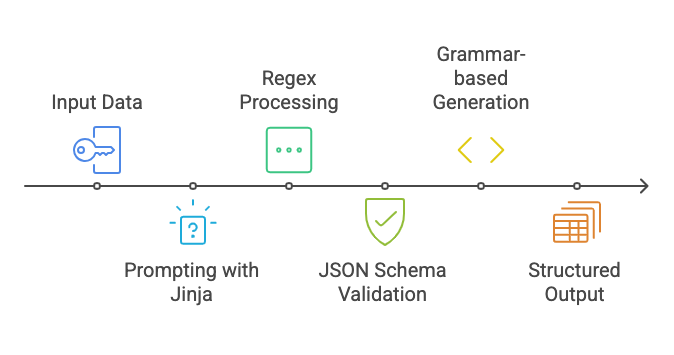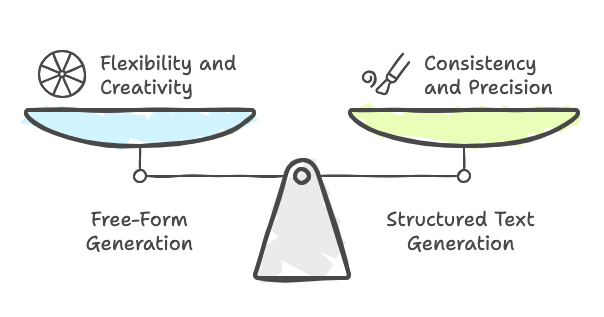Outlines is a Python library designed to revolutionize structured text generation for LLM applications. By providing tools to control and predict LLM outputs, it ensures that the generated text adheres to specific formats and constraints. This structured approach improves reliability and enables seamless integration of LLMs into complex applications, such as data extraction, response formatting, and workflow automation.
In this article, we’ll dive deep into the features, functionality, and potential of Outlines, and how it empowers developers to create structured, reliable, and efficient LLM-based systems.
What is Outlines?
Outlines is an open-source library that provides developers with tools to control and predict LLM outputs. Unlike traditional free-form generation, Outlines focuses on structured generation by ensuring the text adheres to specified formats, constraints, and data types. This level of control is essential for applications where accuracy and reliability are paramount.
Key Features of Outlines

1. Structured Generation
Outlines enables developers to define the structure of the LLM output using multiple techniques:
- Multiple Choices: Limit the output to a predefined set of options.
- Type Constraints: Restrict outputs to specific data types, such as integers or floats.
- Regex-Structured Generation: Use regular expressions to enforce complex yet precise output formats.
- JSON Schema Enforcement: Guarantee that generated text adheres to JSON schemas or Pydantic models.
- Grammar-Structured Generation: Use Context-Free Grammars (CFG) to create syntactically valid outputs for SQL, Python, or other languages.
2. Prompting with Jinja2
Outlines leverages the Jinja2 templating engine for defining reusable and dynamic prompts. This separation of logic from the application code enhances maintainability and modularity.
from outlines import JinjaPrompt
template = JinjaPrompt("What is your {{ attribute }}?")
filled_prompt = template.render(attribute="favorite color")
print(filled_prompt)
3. Multiple Model Support
Outlines supports various LLM providers and architectures, including:
- OpenAI models
- Transformers
- llama.cpp
- exllama2
- Mamba
This flexibility avoids vendor lock-in and allows developers to choose the best model for their specific needs.
4. Python Function Integration
Developers can dynamically specify the output structure by integrating Python functions with the LLM.
from outlines import generate_with_function
def extract_user_details(name: str, age: int):
return f"User: {name}, Age: {age}"
result = generate_with_function(extract_user_details, model="gpt-4")
print(result)5. Performance and Efficiency
Outlines enhances performance by:
- Reducing Inference Costs: Constraints simplify model decision-making, reducing computational overhead.
- Improving Accuracy: Constrained outputs improve task-specific performance for base and fine-tuned models.
- Batch Inference: Support for processing multiple queries simultaneously.
Core Concepts
Structured Generation Techniques
Outlines’ core structured generation methods make it stand out in the LLM ecosystem:
Multiple Choices:
from outlines import choice
options = choice(["red", "blue", "green"])
print(f"Selected option: {options}")Type Constraints:
from outlines import format
number = format("int")
print(f"Generated integer: {number}")Regex Constraints:
from outlines import regex
phone_number = regex(r"\(\d{3}\) \d{3}-\d{4}")
print(f"Generated phone number: {phone_number}")JSON and Grammar-Based Generation
JSON Schema Enforcement:
from outlines import json_schema
schema = {
"type": "object",
"properties": {
"name": {"type": "string"},
"age": {"type": "integer"}
},
"required": ["name", "age"]
}
result = json_schema(schema)
print(result)Grammar-Based Generation:
from outlines import grammar
grammar_definition = """
sentence = noun verb object
noun = "dog" | "cat"
verb = "chased" | "caught"
object = "ball" | "mouse"
"""
sentence = grammar(grammar_definition)
print(sentence)Use Cases for Outlines
- Data Extraction
- Extract structured information from unstructured text, such as emails or documents.
- Response Formatting
- Generate outputs that comply with predefined templates for chatbots or API responses.
- Programming Assistance
- Create syntactically valid SQL queries, Python scripts, or custom code snippets.
- Interactive Applications
- Build reliable and consistent conversational AI systems.
- Automation in Business Workflows
- Use structured text generation for generating invoices, reports, or customer interaction logs.

Getting Started with Outlines
Installation
Outlines can be installed via pip:
pip install outlinesExample: Simple Structured Pipeline
from outlines import Pipeline
# Define the pipeline
pipeline = Pipeline([
{"component": "fetcher", "config": {"source": "https://example.com"}},
{"component": "converter", "config": {"type": "html_to_text"}},
{"component": "generator", "config": {"model": "gpt-4"}}
])
# Execute the pipeline
result = pipeline.run({"query": "What is the content of this webpage?"})
print(result)Integration with vLLM
Outlines integrates seamlessly with vLLM for serving models at scale. A Docker image is available for streamlined deployment:
docker pull dottxtai/outlines-vllm
docker run -p 8080:8080 dottxtai/outlines-vllmAdvantages of Outlines Over Free-Form Generation
- Reliability: Predictable outputs through structured constraints.
- Efficiency: Reduced computational overhead during inference.
- Scalability: Handles complex workflows with ease.
- Flexibility: Compatible with multiple LLM providers and supports dynamic workflows.
Conclusion
Outlines is a game-changing Python library that brings reliability, predictability, and efficiency to the world of LLMs. Its robust structured generation techniques, integration capabilities, and active development make it an essential tool for developers building sophisticated applications with LLMs. Whether you’re creating interactive chatbots, data extraction tools, or workflow automation systems, Outlines offers the control and precision you need.
Explore the library today and take your LLM-powered applications to the next level.
Further Resources
- Outlines Documentation: Official Docs
- Community Support: Join the Discord
- Tutorials and Examples: Visit the Cookbook
- GitHub Repository: Outlines on GitHub
Explore More
- AI Services: Explore our AI services for more details.
- Digital Product Development: Discover our digital product development expertise.
- Design Innovation: Learn about our design innovation approach.





Leave a Reply